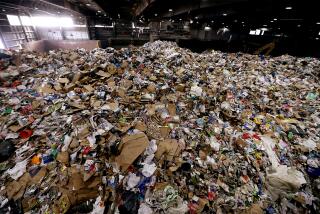Cruise Ships Clean Up Garbage Practices
- Share via
MIAMI — A cruise ship recently embarked on its maiden voyage with state-of-the-art garbage facilities and a promise by passengers to be friendly to the environment.
It’s all part of an effort to set a new standard for an industry dependent on pristine waters.
Anyone spotted tossing as much as a cigarette butt into the waters of the South Pacific from the Frontier Spirit will be fined $50, said Lars Wikander, president of Salen-Lindblad Cruising.
“Even biodegradable matter, such as food, will not be put overboard when we’re in ecologically delicate regions. We don’t want to disturb the feeding and breeding patterns of animal species in these areas,” Wikander said from his headquarters in New York.
The $50-million, 164-passenger Frontier Spirit will freeze its food and plastic waste, grind its glass to sand and burn the rest in specially filtered incinerators, said Wikander, who contends that the ship establishes a new non-polluting standard for the cruise industry.
Salen-Lindblad can afford to install this technology--its passengers tend to be well-off environmentalists who are willing to pay a little more and follow strict rules in order to see exotic locales.
But even mainstream cruise lines pitching more affordable trips to middle-class tourists on the well-traveled Caribbean circuit are trying to make the most of the ecotourism trend.
“People who pay for cruises are escaping to the beautiful beaches and crystal-clear, deep blue waters you advertise in your brochures. Dumping trash at sea, even though it’s within the law, doesn’t fit this image,” Coast Guard Cmdr. Darryle Waldron told an international conference of cruise line officials in Miami recently.
International regulations forbid the dumping of plastics anywhere in the ocean, but glass, paper, metal and other garbage can legally be tossed overboard 25 nautical miles from shore. Violators face up to $25,000 in fines.
The Coast Guard has investigated 57 allegations of illegal dumping since the regulations took effect in May, 1989, and many of the charges are brought by cruise ship passengers, Waldron said.
Once, 50 passengers signed a letter saying they saw the crew of their cruise ship dump bag after plastic bag of garbage over the side.
“It’s very difficult for ship captains to deny that sort of a complaint,” said Waldron, who wouldn’t identify the ship.
Cargo vessels and weekend pleasure-boaters are responsible for most of the ocean debris, Waldron said, but the cruise ships’ image still suffered when a group of volunteers found more than 65 plastic cups and shampoo bottles bearing their insignias in a Sept. 22 cleanup of Florida beaches.
Fewer than 100 items out of the more than 399,666 pounds of garbage collected in the Center for Marine Conservation cleanup doesn’t seem like much, but the center’s Gina Ruiz says cruise ship trash remains troublesome.
“What washes up is only a very small sampling of what’s actually out there. It’s a significant amount of garbage,” Ruiz said.
Miami-based Carnival Cruise Lines doesn’t plan to fine anybody for throwing trash overboard, but its passengers are encouraged to separate plastics from glass, cans and paper in garbage cans on the deck.
And on Royal Caribbean Cruise Lines’ newer ships, huge sewage treatment systems and incinerators that burn at 900 degrees Fahrenheit take all the pollutants out of the waste released into the air and sea, said spokesman Lloyd Axelrod.
More to Read
Sign up for The Wild
We’ll help you find the best places to hike, bike and run, as well as the perfect silent spots for meditation and yoga.
You may occasionally receive promotional content from the Los Angeles Times.






